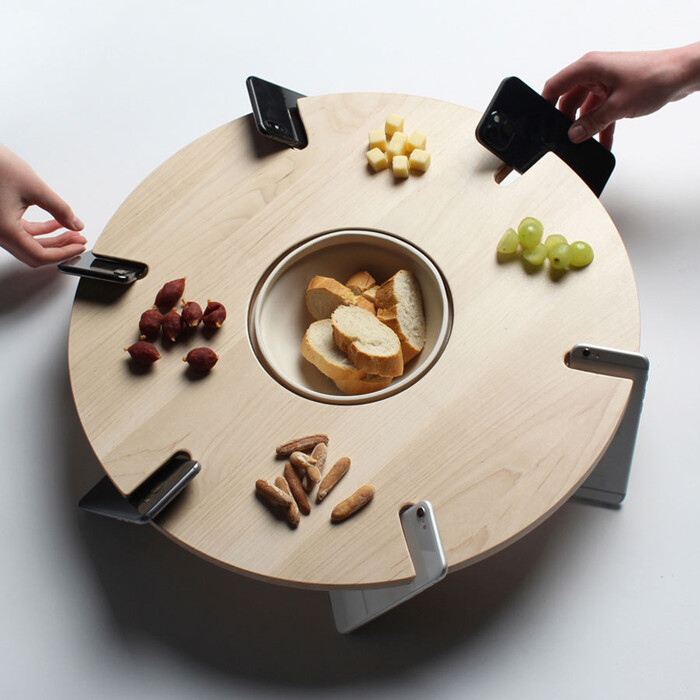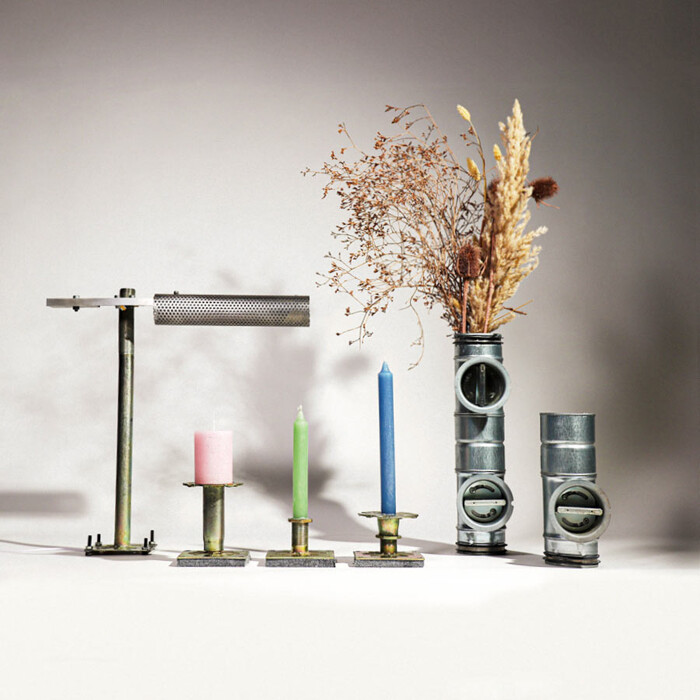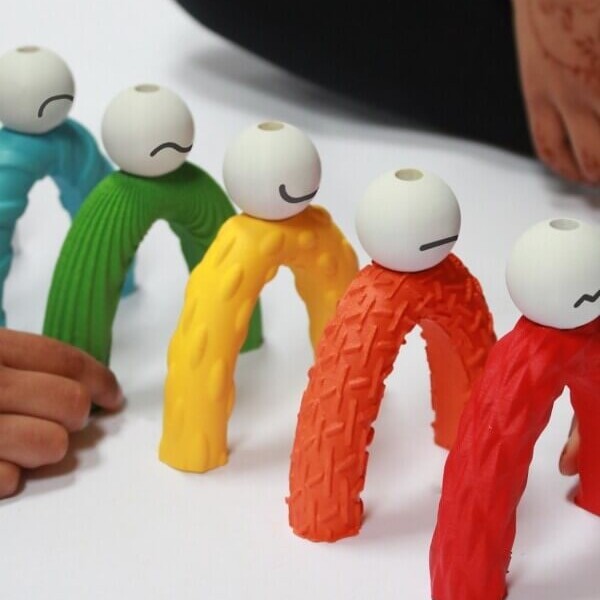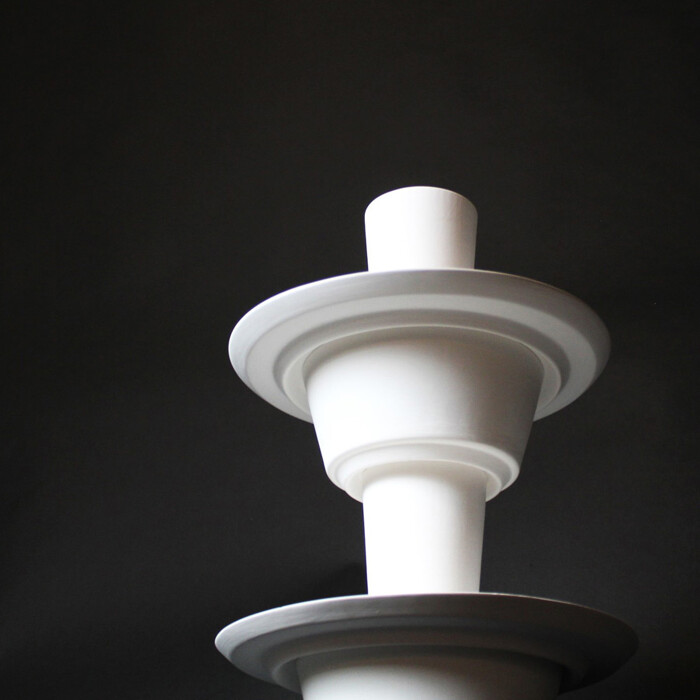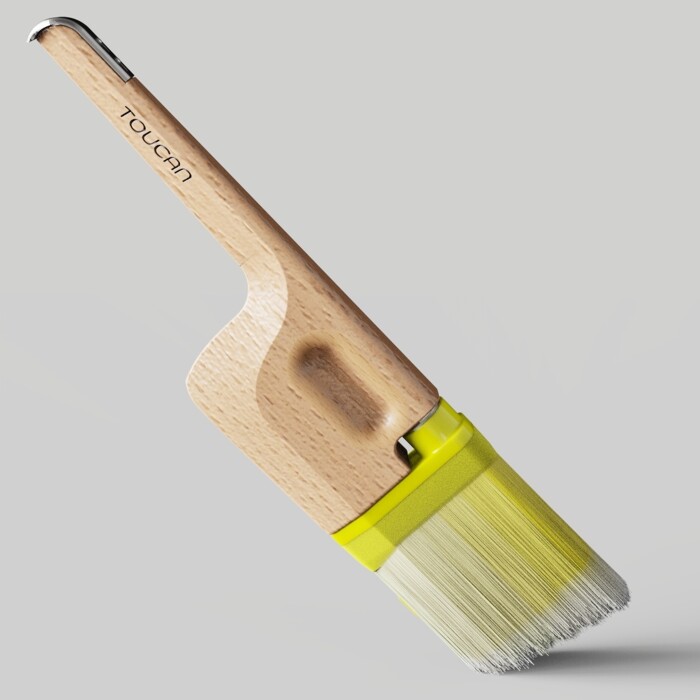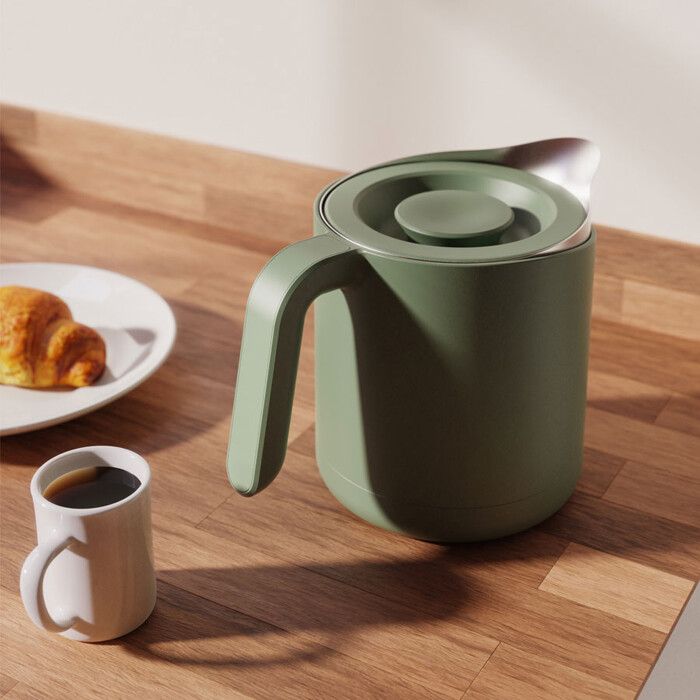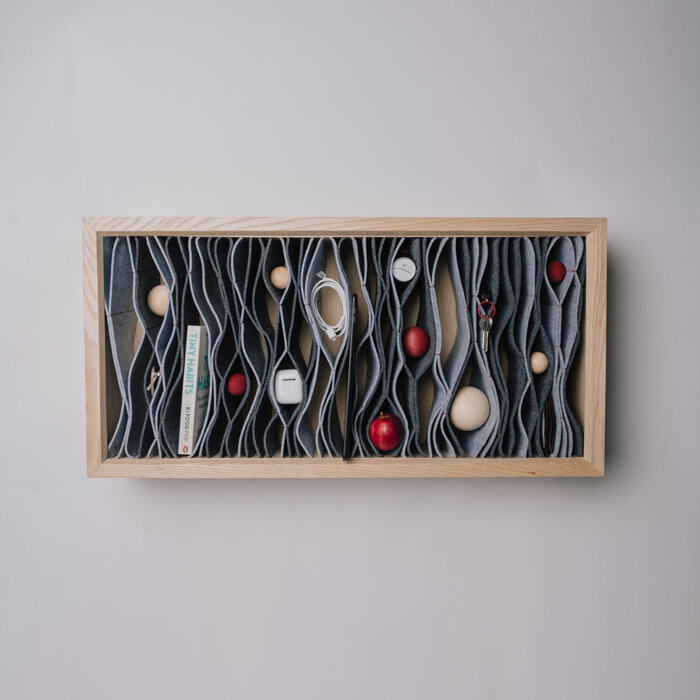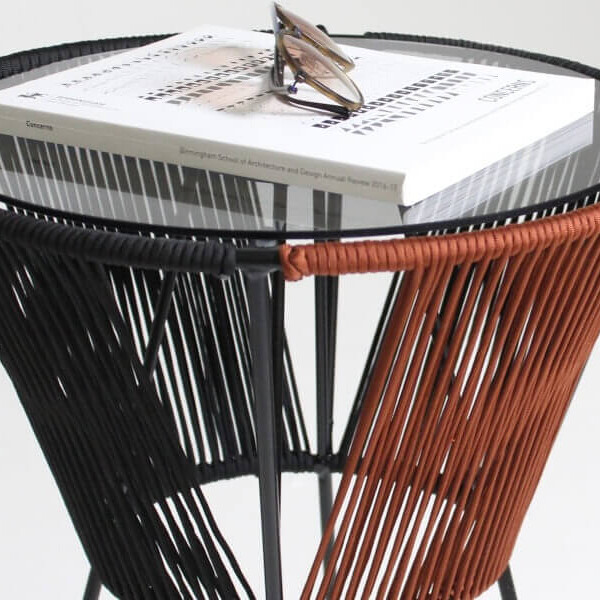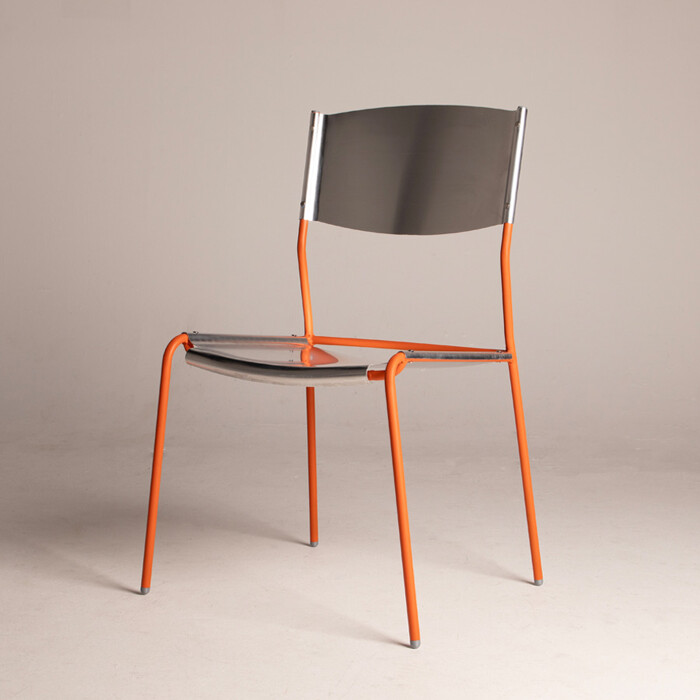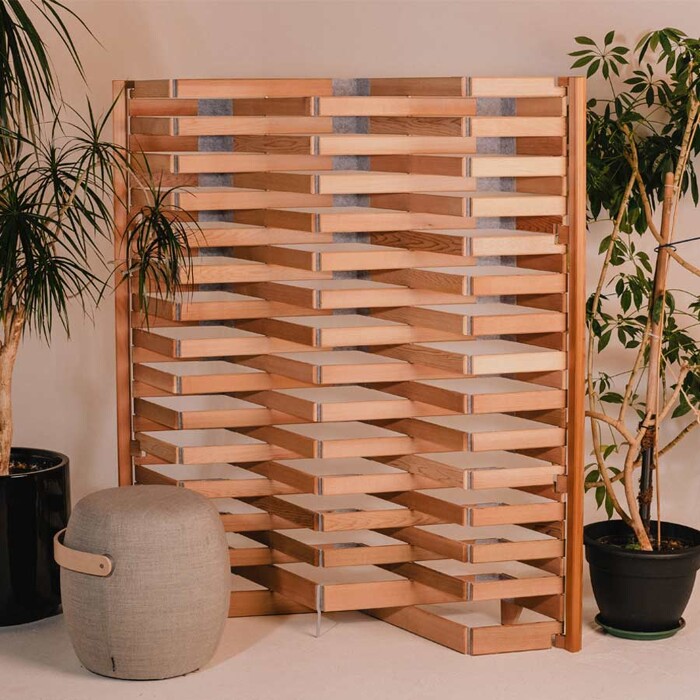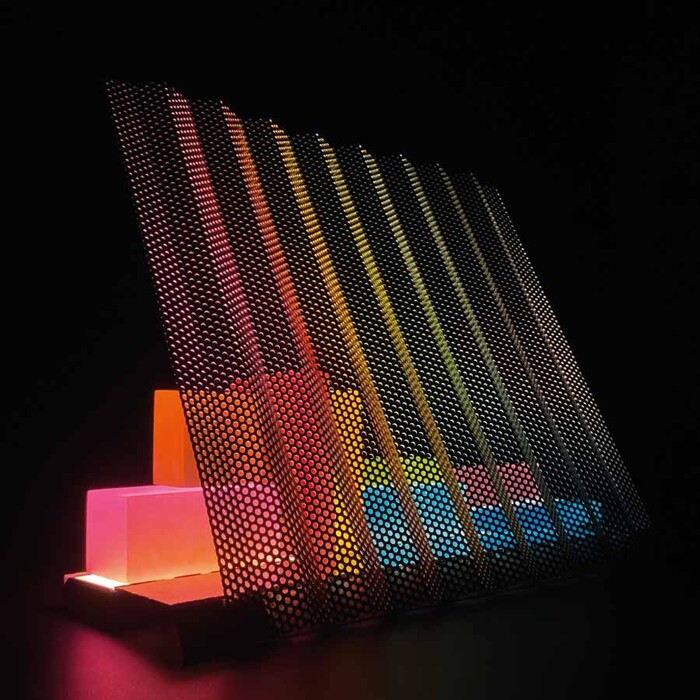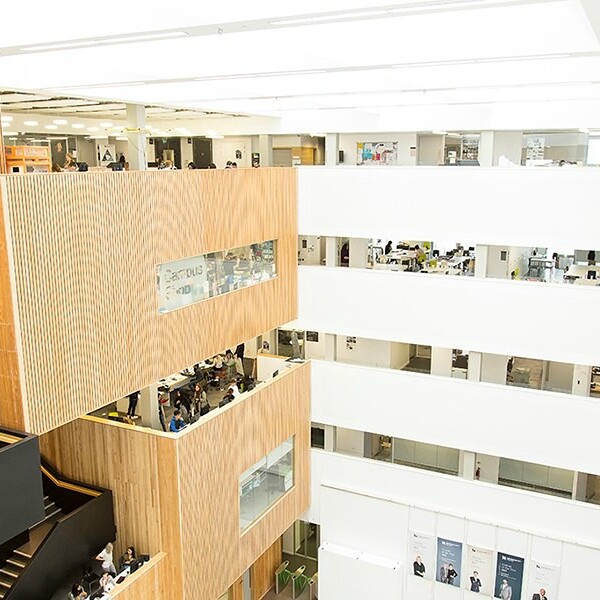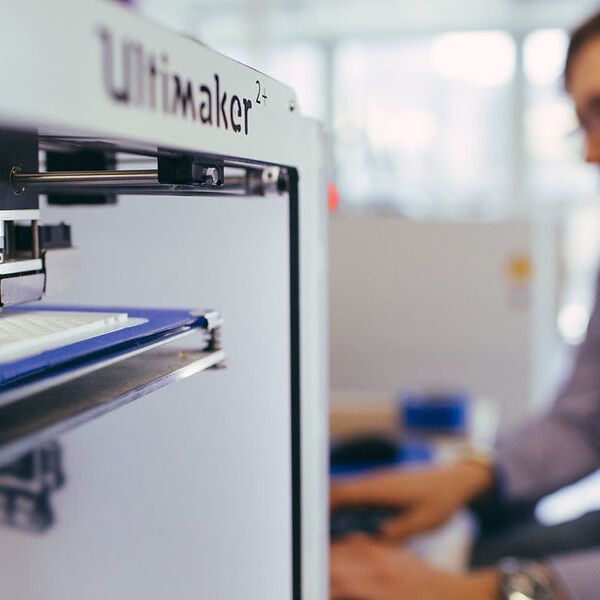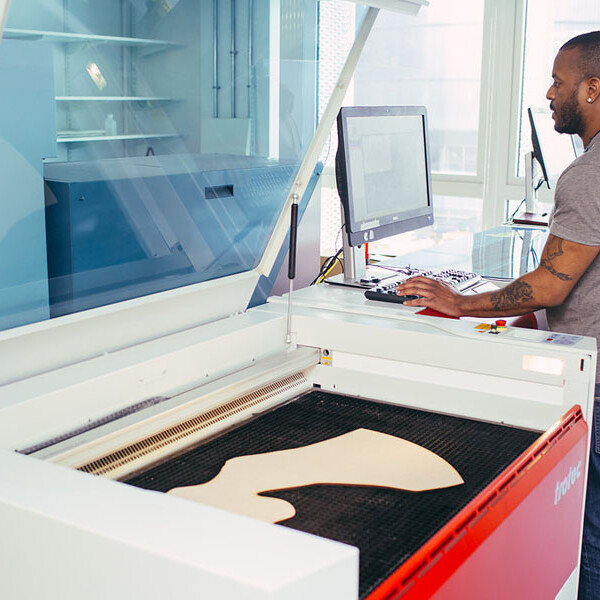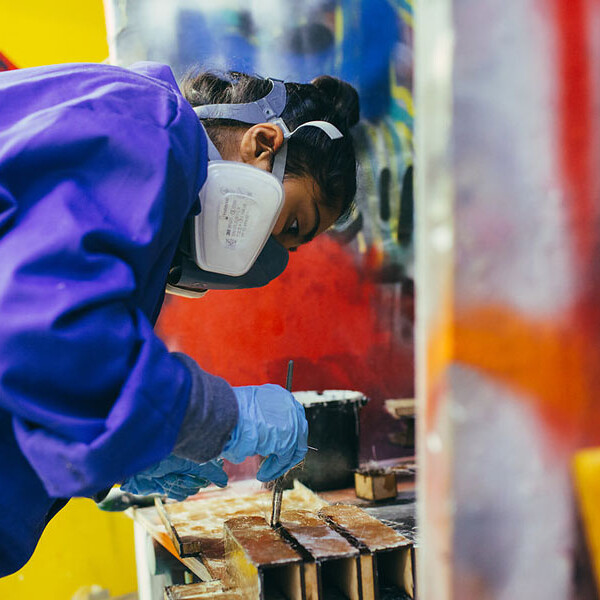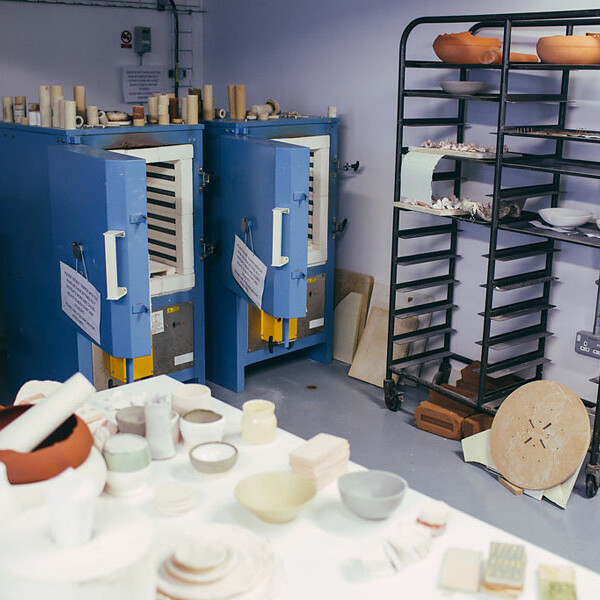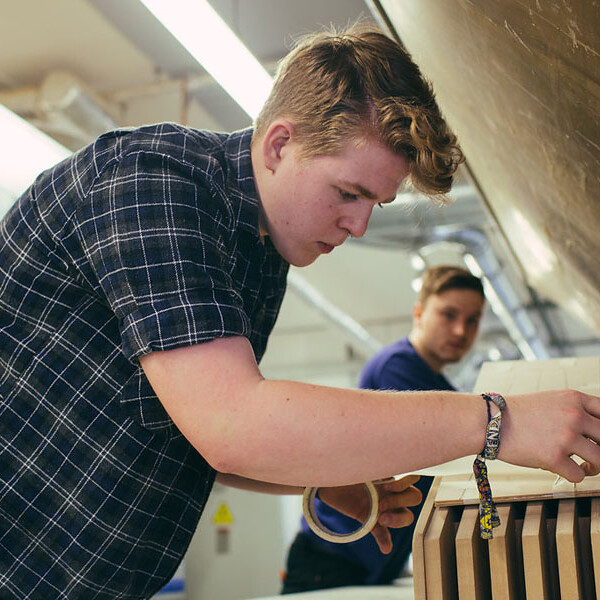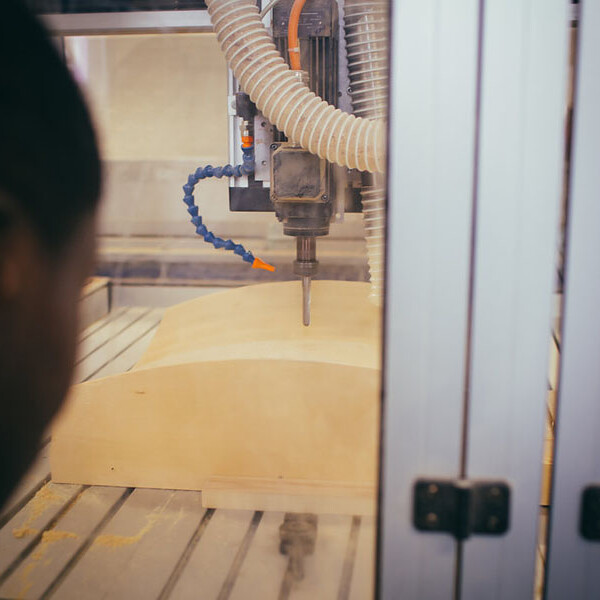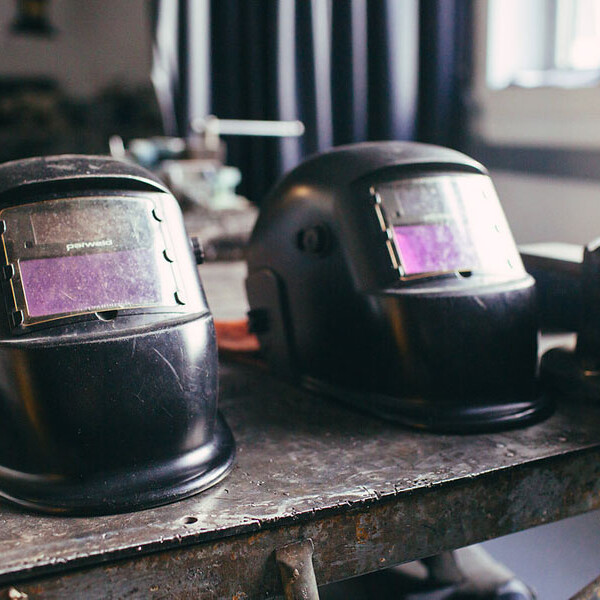Product Design with a Foundation Year - BA (Hons)
Currently viewing course to start in 2025/26 Entry.
September 2025 — UCAS code W24F
This Foundation Year has been specifically designed to allow you to undertake an additional year of study to build stronger creative footings that ensure successful progression through your chosen degree....
48 points required
Calculate UCAS pointsClearing places available
- Level Foundation
- Study mode Full Time
- Award BA (Hons)
- Start date September 2025
- Fees View course fees
- Subject
- Location Margaret Street
This course is:
Open to International Students
Overview
Clearing 2025
48 points (or equivalent) is the minimum you will need to be considered for this course in Clearing.
Use the UCAS Tariff Calculator to work out your points.
This Foundation Year has been specifically designed to allow you to undertake an additional year of study to build stronger creative footings that ensure successful progression through your chosen degree.
Working in a friendly, lively and energetic environment, you will be given the freedom to expand your knowledge of practical skills, creative exploration and conceptual thinking, underpinned by broad critical understanding, academic writing and emerging theoretical principles.
Dedicated Foundation tutors, BA staff and experienced technicians will support you throughout the year and work closely with you to prepare you for progression. There will be a range of opportunities to work on collaborative and individual projects, aimed to build your social skills and identify your role as a developing practitioner.
Throughout the year you will be challenged with projects that question your current creative experiences and explore a breadth of experimentation to broaden your technical and critical understanding.
You will be encouraged to analyse methods and materials appropriate for creative development and to question your position in relation to historical, contemporary and future world scenarios. Both practical and written research tasks will be supported by one to one tutorials and small discussion groups to help you constructively build academic and social confidence.
The two first semester modules will form the building blocks for future work and will explore core principles of creative practice focussing on the development of technical confidence, study skills and productivity. The two final semester modules will encourage a positive integration between research and practice, challenging decision making and technical competency. This semester is designed to empower you with independent learning skills appropriate for your future BA studies.
On successful completion of the Foundation Year, you will have the flexibility to change direction and switch courses onto a related undergraduate degree programme within the College of Art and Design or the College of Digital Arts at BCU. In order to progress onto your BA Programme, you must successfully pass all four core modules (totalling 120 credits).
What's covered in this course?
You will examine the process of designing and developing functional, inclusive, and sustainable products and furniture, understanding how social and cultural factors influence design decisions. You will develop knowledge of design in response to collaborative, professional, commercial, and economic considerations.
Alongside research and design development skills, you will increase your practical knowledge through extensive hands-on exploration. Engaging with making from the outset enables you to fully realise design concepts and create convincing models and prototypes. With strong contemporary design thinking, you will explore various ‘scales of manufacture’ to position yourself within a global industry.
By working on live projects, work placements and collaborative projects, you will learn how businesses operate at a commercial, technological, ethical, and sustainable level.
Furniture Design specialism
All students will be introduced to core modules exploring the fundamentals of designing products and furniture. You will have the opportunity to focus exclusively on Furniture Design from semester 2 of your second year, starting with the Design Focus module, before specialising further in your final year.
If you choose to specialise in Furniture Design, you will cover the same curriculum but opt for furniture-related project briefs. This option will suit those students who wish to develop and enhance their making skills through the design, development and production of furniture and related products. You will be able to explore furniture design across various production scales, from bespoke to mass manufacture. You will graduate with BA (Hons) Product Design (Furniture Design).
I would highly recommend this course to anyone looking to study design. The facilities are incredible and the tutors are really supportive and helpful. I have learnt so much and developed as a designer more than I expected to. Thanks to this course, I was able to win the Made.com award at New Designers which was an incredible experience. I was also shortlisted for 3 other awards too! Throughout New Designers I was approached by several companies who were hiring and interested in seeing my portfolio. Fortunately I secured a job before the end of final year as a Product Designer for Foresso. I really love my job and I'm so grateful to BCU for providing me with the skills I needed for the industry.
Graduate - Aamana Bibi Nawaz (Winner – New Designers 2022 – MADE.COM Collaboration Award), Designer at Habitat
Why Choose Us?
- Live projects and industrial collaborations provide you with invaluable real-world experiences and hone your communication and professional development skills.
- You will develop practical skills through extensive workshop practice within our Ceramics, Plaster, Wood and Metal workshops.
- From water jet cutting, to 3D printing, you will develop skills in rapid prototyping and digitally driven techniques.
- The course has achieved notable success in design events, securing major awards and commendations at New Designers and the Young Furniture Makers Exhibition.
- Two-thirds of the impact of our research was judged to be very considerable (3*) or outstanding (4*) - REF2021.
Open Days
Join us for an Open Day where you'll be able to learn about this course in detail, chat to students, explore our campus and tour accommodation.
Next Open Day: 4 October 2025
Entry Requirements
These entry requirements apply for entry in 2025/26.
All required qualifications/grades must have been achieved and evidenced at the earliest opportunity after accepting an offer to help confirm admission and allow for on-time enrolment. This can also include other requirements, like a fee status form and relevant documents. Applicants can track their application and outstanding information requests through their BCU mySRS account.
48 points (or equivalent) is the minimum you will need to be considered for this course in Clearing.
Use the UCAS Tariff Calculator to work out your points.
Essential requirements
80 UCAS Tariff points. Learn more about UCAS Tariff points.
If you have a qualification that is not listed, please contact us.
Fees & How to Apply
UK students
Annual and modular tuition fees shown are applicable to the first year of study. The University reserves the right to increase fees for subsequent years of study in line with increases in inflation (capped at 5%) or to reflect changes in Government funding policies or changes agreed by Parliament. View fees for continuing students.
Award: BA (Hons)
Starting: Sep 2025
- Mode
- Duration
- Fees
- Full Time
- 4 years
- £9,535 in 2025/26
- Apply via Clearing
International students
Annual and modular tuition fees shown are applicable to the first year of study. The University reserves the right to increase fees for subsequent years of study in line with increases in inflation (capped at 5%) or to reflect changes in Government funding policies or changes agreed by Parliament. View fees for continuing students.
Award: BA (Hons)
Starting: Sep 2025
- Mode
- Duration
- Fees
- Full Time
- 4 years
- £17,690 in 2025/26
48 points (or equivalent) is the minimum you will need to be considered for this course in Clearing.
Use the UCAS Tariff Calculator to work out your points.
You are not required to submit a portfolio for this course.
Course in Depth
Foundation year
The foundation year provides an opportunity to explore the exciting world of contemporary design through various scales and develop creative solutions, encapsulating Landscape Architecture, Architecture, Interior Architecture and Design, and Product Design.
It provides a supported learning environment to explore conceptual ideas through to detailed design, mapping and modelling and is assessed through mini design-focussed projects and a specialised final project in a chosen field.
The foundation year is ideally suited to students who need to develop their design, drawing, technical and presentations skills before entering a BA course, or for those who have not yet decided which specific design discipline or career to pursue.
In order to complete this course, you must successfully complete all the following CORE modules (totalling 120 credits):
This module explores the term ‘practice’ as the process of making, developing and recording information. We will work with you to explore the development of your work based on a set project, looking at a number of documentation strategies while experimenting with a broad range of materials. You will have the opportunity to meet artists and practitioners through local gallery visits and in studio activities and will learn to analyse your work through tutorials and small group discussions.
Artists work in a globally influenced, culturally diverse, and technologically advancing world.
Their art is a dynamic combination of materials, methods, concepts, and subjects that challenge traditional boundaries and defy easy definition.
This module will look at experimental approaches to drawing to identify radical new solutions from the perspective of the contemporary world we live in.
Your brief is to apply the process of ‘rework’ to found imagery, object/s and or photographs
During this module you will meet lecturers, researchers and partners from across BCU, the city and further afield to open your understanding of practiced based creative work.
Through lectures and workshops, you will be introduced to the versatility of subject areas in terms of ideas, development, research, materials, techniques and contexts.
You will also be introduced to critical thinking seminars and workshops alongside group discussion and individual tutorials.
Creative realisation is not just about the practice of producing creative responses, it is about identifying the factors that generate creative thinking and facilitating the process.
For this module you will draw on your own creative strategies to facilitate the development of a project that is appropriate for progression onto your chosen BA (Hons) course.
To identify the focus for your project you must research ‘Future Horizons’ from the rapidly changing world around you - anything that reflects new innovations, e.g. seismic changes, space travel, war, social conflict, internationalisation, environment, technology, architecture, bio-art etc. – whether great or small.
Year one
In order to complete this course you must successfully complete all the following CORE modules (totalling 120 credits):
Design Essentials explores fundamental design principles and processes crucial for effective design practice. Through a blend of theoretical understanding and practical application, the module equips you with essential skills in visual expression, communication, and creative design approaches.
You will develop core principles of visual communication, developing both 2D and 3D skills necessary for undertaking design tasks.
Drawing techniques, including orthographic, perspective, and analytical drawing are explored, alongside creative visualisation methods such as mark-making and abstract drawing to stimulate idea generation and representation. Additionally, you will develop CAD skills to produce technical drawings appropriate for manufacturing technologies.
Professional Futures: Communication equips you with the initial skills and knowledge necessary for your future career. The module explores the role of effective communication in the context of your emerging design practice. You will engage with theoretical frameworks and practical exercises to develop your contextual understanding of the subject, recognising their relevance in research, development and communication of key themes and ideas.
A proportion of module content is shared across design disciplines, blending traditional studio sessions activities with the use online resources. This blended approach enhances, engagement and digital literacy.
We have designed this module to be flexible so that assessments incorporate presentations, written assignments, participation in critiques, and reflective exercises to evaluate communication skills, professional development, and understanding of ethical and cultural considerations in design practice.
'Design for Production' introduces core design aspects related to materials, processes, and digital manufacturing. This module explores the relationship between design and production, aiming to provide you with essential knowledge and practical skills for effective design implementation.
Through the module, you will explore the principles of digital design and prototyping techniques. Debate will be encouraged to argue the appropriate selection and application of materials, finishes, production processes and construction/assembly methods within the context of a design project.
You will also examine and design for various digital production technologies such as CNC machining and laser cutting, gaining insights into their applications, advantages and limitations. A variety of materials will be highlighted through the analysis of existing artefacts.
"Design in Context" explores design principles and considerations for designing within various contexts, helping you to develop an awareness of the impact of economies of scale on design thinking. The module will introduce fundamental strategies in designing for different markets and you will explore the relationships between scale, context and implementation.
Digital and analogue studio and workshop-based projects will focus on design approaches from the perspective of a Product Designer, Furniture Designer and Designer Maker. Undertaking specialist ‘scale’ projects will enable you to explore a range of design factors including research requirements, precedent analysis, design issues, costing, product lifecycle, intellectual property, and project management.
The module provides you with an opportunity to consolidate learning throughout Level 4, with an increased emphasis on making and presentation skills, CAD development, research and creative problem-solving.
Year two
In order to complete this course you must successfully complete all the following CORE modules (totalling 100 credits)
Design for Industry will guide students through observational and analytical approaches necessary for developing sustainable, inclusive, and ethical design solutions. This module aims to integrate industry specific philosophies and frameworks, building upon core design skills introduced at level 4 of the course. Emphasis will be placed on gaining commercial understanding through the creation of detailed design documentation, including technical drawings, specifications, and project briefs. Manufacturing methods and production techniques will also be explored as significant design constraints within the module.
Students will be encouraged to prioritise the 'needs and requirements' of the person/client/user throughout the design process. Design development frameworks, such as user-centred design, will be introduced to facilitate the creation of products tailored to user preferences and needs. The goal is to design products that seamlessly align with user expectations and enhance user experience.
To achieve this, rigorous testing and observation of user behaviour, emotions, and difficulties will be essential. This iterative testing process allows designers to identify and address any issues or opportunities for improvement in the design. Additionally, students will have opportunities to explore factors contributing to the success of products or furniture pieces in enriching our lives and environments.
‘Professional Futures: Collaboration’ is designed to equip you with the essential skills for success in the diverse and collaborative field of design. With collaboration and communication as central themes, you will learn to navigate interdisciplinary teamwork and understand different design processes, methods and outcomes.
The module provides an opportunity to tackle real-world challenges through a cross-disciplinary collaborative project. This allows you to have a shared and reflective learning experience contributing to a shared task, preparing you for the demands of your future career. You will learn to convey ideas, concepts and project narratives with clarity and impact.
Assessment involves interdisciplinary teamwork to develop a creative project, emphasising communication, creativity, and project outcomes.
This module allows students to focus their studies by conducting self-directed practice, researching a personal area of interest, and creating outcomes that reflect their developing knowledge of three dimensional design. It serves as a guided introduction to the largely self-initiated study they will experience in Level 6.
This module aims to increase understanding of the relationship between design research and practice, as well as enhance students’ ability to evaluate and contextualise design within broader fields. It is also designed to improve communication skills to articulate design processes and outcomes to a professional standard and develop confidence in exploring design techniques, materials, and processes. Our students will achieve this through guided independent personal study, demonstrating increasing knowledge of both academic and industry-based design practice.
Students will explore contemporary design issues such as environmental concerns, sustainability, technological advancements, new production methods, cultural diversity and inclusive design. They will formulate research questions or identify opportunities related to their own practice, underpinning their design project.
In order to complete this course, you must successfully complete at least 20 credits from the following list of OPTIONAL modules.
This module provides an opportunity for you to apply your knowledge and skills to an external, professional brief. The brief will be ‘real’, set in negotiation with an external client/agency/community, or it may be a simulation, inspired by a typical professional scenario you might experience in a work situation. The brief will enable you to apply your discipline-specific skills broadly, collaborating with your fellow students and, where relevant, across disciplines and with other stakeholders. Your project should consider sustainability and address relevant UN Sustainable Development Goals as a key aspect of contemporary creative industries work.
The module provides an opportunity for you to engage in a responsive, imaginative, and professional manner with an aspect of your subject area, which contributes to the development of employability skills within the supportive infrastructure of the University. You will be supported to approach the project with curiosity, openness, critical thinking and innovation as well as making use of your discipline-specific skills.
Creative careers often lead individuals on unexpected journeys, traversing diverse paths. Recognizing and seizing opportunities becomes pivotal in shaping a fulfilling portfolio career—one that harnesses your creative abilities while sustaining your livelihood. Whether you’re crafting artistic artifacts, performing, providing services, or offering consultancy, the art of promoting and pitching ideas lies at the heart of an independent, entrepreneurial journey.
In this module, we delve into the essential facets of an entrepreneurial career. Whether you see yourself as a designer-maker, actor, musician, illustrator, artist, writer, filmmaker or a blend of any number of roles within a portfolio career, we’ll equip you with the tools to articulate your experiences and work confidently. Expect surprises along the way—opportunities that may reveal themselves unexpectedly!
Central to this experience is a 70-hour work placement, which you can complete either in a concentrated block or spread out over the duration of the module. During this placement, you’ll have the opportunity to develop your professional attributes and subject-specific skills.
To align closely with real-world job market conditions, you should expect to prepare a current and relevant CV, attend interviews, conduct research to source your own placement.
Support will be available from academic staff and the ADM Careers+ service to help you in securing your placement. It’s important to note that your placement must be approved by your tutor no later than the final week of teaching in December. If you’re unable to find a suitable placement by then or if your placement falls through, you’ll be transferred to an alternative module.
Core modules are guaranteed to run. Optional modules will vary from year to year and the published list is indicative only.
Year three
In order to complete this course you must successfully complete all the following CORE modules (totalling 120 credits)
Professional Futures: Presentation provides final-year students with essential skills and strategies for navigating the design industry. With a focus on ‘presentation’ and employability, the module provides you with guidance on refining your skills, whilst preparing you for the next stage of your design journey.
Emphasising career evaluation and identifying personal strengths through reflective practice, you will gain insight into your career goals and aspirations. Portfolio development will also guide you in creating impactful presentations of your work. Building on this foundation, you will examine the development of advanced presentation skills, essential for effectively communicating design concepts and ideas to diverse audiences.
You will explore strategies for enhancing your employability within the design industry. From self promotion techniques to professional networking strategies, you will gain insights into how to effectively market yourself and establish valuable connections within the design community.
The purpose of this module is to enable you to undertake an in-depth and theoretically informed research project, exploring an area that is of personal interest to you. It is important that we can support you appropriately, so you will be guided towards choosing a research topic which is relevant to your discipline. The outcome of this module will take the form of a research report documenting your findings. This report is intended to serve as a foundation for a subsequent design development project.
At this level, autonomy in conducting your research is expected, however, you will receive one-to-one tutorial support from the teaching team. This module prioritises the advancement of essential research skills, including relevant research methodologies, developing a research proposal, and critical analysis and synthesis of findings. Staff guidance will ensure you can conduct research effectively while adhering to ethical and professional standards. As you progress, additional support will be available - this may be facilitated through group seminars, writing workshops, and a range of online resources to support the development of your research project.
This module offers you the opportunity to develop and deliver a significant self-directed design project, building upon the research conclusions from the previous module ‘Major Research Project’ (Discover & Define). With guidance from academic staff, you will undertake a comprehensive design journey from initial concept to final execution, showcasing the 2D and 3D skills acquired throughout the course.
While independence is expected, tutorial support is tailored to your chosen topic and ensures that guidance and support align with specific project needs. Group tutorials and critiques will offer additional assistance.
Weekly studio-based updates are required throughout the module, in which you will discuss your concepts/development and general progress. We encourage interaction and constructive feedback among peers to facilitate collaborative learning, enrich design discourse and support a community of practice.
Download course specification
Download nowTaught by experienced designers, makers and academics, this course combines practice with theory to give you a fully rounded learning experience.
Extensive workshop facilities will help you to realise your proposals, creating functional and commercially viable designs. This hands-on approach allows you to understand the opportunities and limitations of materials and construction methods.
BOSS X BCU project
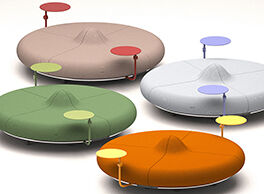
Working in collaboration with BOSS design, second-year students were tasked with exploring and developing innovative products, artefacts or furniture concepts that enhance, improve and better facilitate the future multi-generational workspace, in either the residential office environment, ‘conventional’ onsite office or both.
Students engaged with a variety of discipline-aligned methods including: drawing to explore ideas, model making to varying scales which are appropriate, engaging and researching ergonomics and anthropometrics, as well as, researching ‘real world’ manufacturing processes and techniques utilised within industry.
Communication of ideas visually and verbally, also formed a significant part of this project, with students gaining invaluable employability skills by presenting directly to a client and possible future employer.
Several students participated in alternate weeklong placements with Boss Design. This provides invaluable industry experience and significant personal development opportunities, which undoubtedly helps those students during their final year on the course and after graduation.
Trips and visits
A key element of being a designer is exploring different cultural environments and capturing design inspirations from new sources. BA (Hons) Product Design students can take international study trips to places like New York and Venice. Closer to home, students have visited major design museums and undertaken factory visits to local manufacturers from plastic rotational moulding to aluminium casting and injection moulding processes.
Employability
Enhancing employability skills
The course has a vocational emphasis and is focused on employability. Throughout your study you will engage with real briefs, collaborative opportunities and external industry links. You will develop skills in a broad range of working approaches, from synthesising and applying problem solving and creative thinking skills, to 3D computer modelling, where you will use the latest industry standard software.
Extensive workshops support modelling and prototyping skills, and you will create high-quality outcomes using a wide range of materials, techniques and processes. The course supports personal development as a creative, knowledgeable designer, maximising the potential to obtain positions in national and global companies.
The course develops skills and experience in and around the subject of scales of manufacture, from bespoke, one-off and batch production to standardised mass production. The interdisciplinary nature of design engages relationships across a broad spectrum of specialist areas of study, and we nurture this philosophy through collaborative and professional practice approaches.
Placements
Working with local industry develops professional understanding and creates opportunities for work placements and internships.
In the past, students have worked with interior designers, product designers, furniture manufactures, and design fabricators, including McMaster, HF Contracts, JSC Rotational and Scruffy Dog Design, Create and Deliver.
My internship at Kirkdale Studios during my third year was a great creative experience and helped me to navigate the transition from a student to a working designer. I was given the opportunity to work on live projects, communicate directly with factories, and learn professional skills before even graduating.
Evie Mcginley – Kirkdale Studio
Our Graduates
With industry-linked projects, students have been able to forge links with design and manufacturing companies. From an initial two-week internship with a plastics rotational mouldings company during his second year, product design student Oli Graham went on to become their full-time industrial designer following graduation.
Facilities & Staff

Our Facilities
When you join Birmingham City University, the first thing you will notice is the exceptional quality of our campuses. With an investment of over £500 million across our buildings and facilities, we are committed to giving you the very best learning environment to help shape your experience.
You will be based in our multi-million pound Parkside building – a state of the art facility located within our City Centre Campus. Here you will have full access to our recently upgraded, high spec CAD (Computer-Aided-Design) workstations situated within our dedicated computer labs and open access areas. We also provide access to leading edge digital design software, enabling you to explore technical drawing, graphics, 3D modelling, visualization, animation, computation, simulation, and virtual reality.
The Parkside Building is also home to our digital fabrication labs, where you will be able to explore 3D printing, laser cutting, CNC machining, ceramics, glass and traditional model-making, guided by our team of expert technicians with access to our on-site material store, and professional printing facilities.
You’ll also benefit from:
- Design studios
- Physical and digital library
- Loanable laptops
- Dedicated social spaces
- Cafés
Photo Gallery
From industry-standard software, to our workshops and studio spaces, everything you need will be at your fingertips from day one. Working with our dedicated teaching teams and expert technicians, you'll be supported from concept through to completion.
Making
Workshop facilities are integral to the programme and you will have access to an extensive range of prototyping equipment, including wood machining equipment, metal fabrication, CNC router, four axis milling, waterjet cutting, plaster, ceramic, glass workshops, 3D printing, laser cutting and etching, plastic forming, and ply moulding. A large range of hand and power tools also support model making and prototyping for product and furniture design.
Our staff
Jason Nicholson
Product Design Course Leader
From a career journey beginning in metalsmithing and related products, Jason has a wide experience in various product design sectors – in particular furniture and lighting design. He has taught across a range of specialist courses, focussing and developing ‘making’ as an integral part of the design process. A ‘hands-on’ member of staff with...
More about JasonWayne Pottinger
Product Design Lecturer
Wayne Pottinger is a lecturer and coordinator of the level five (second year) Product Design course. Before joining Birmingham City University Wayne established his own design practice alongside Natalie Cole. Pottinger and Cole’s practice designed and developed products for retail and their objects were stocked in well-respected furniture and...
More about WayneEmma Jones
Product Design Lecturer
Emma is a Lecturer on the BA (Hons) Product Design program, currently teaching across all three levels of the course. Before joining the Faculty of Architecture, Design, and Media as a full-time member of staff in January 2022, she was a Specialist Lecturer in Architecture and Design, delivering 3D design communication modules in industry-leading...
More about Emma







